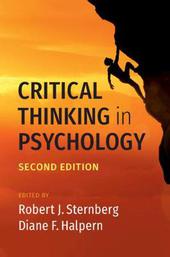
|
Critical Thinking in Psychology
Hardback
Main Details
| Title |
Critical Thinking in Psychology
|
| Authors and Contributors |
Edited by Robert J. Sternberg
|
|
Edited by Diane F. Halpern
|
| Physical Properties |
| Format:Hardback | | Pages:402 | | Dimensions(mm): Height 235,Width 158 |
|
| ISBN/Barcode |
9781108497152
|
| Classifications | Dewey:153.42 |
|---|
| Audience | | Tertiary Education (US: College) | | Professional & Vocational | |
|---|
| Edition |
2nd Revised edition
|
| Illustrations |
Worked examples or Exercises; 12 Tables, black and white; 9 Line drawings, black and white
|
|
Publishing Details |
| Publisher |
Cambridge University Press
|
| Imprint |
Cambridge University Press
|
| Publication Date |
16 January 2020 |
| Publication Country |
United Kingdom
|
Description
Good scientific research depends on critical thinking at least as much as factual knowledge; psychology is no exception to this rule. And yet, despite the importance of critical thinking, psychology students are rarely taught how to think critically about the theories, methods, and concepts they must use. This book shows students and researchers how to think critically about key topics such as experimental research, statistical inference, case studies, logical fallacies, and ethical judgments. Using updated research findings and new insights, this volume provides a comprehensive overview of what critical thinking is and how to teach it in psychology. Written by leading experts in critical thinking in psychology, each chapter contains useful pedagogical features, such as critical-thinking questions, brief summaries, and definitions of key terms. It also supplies descriptions of each chapter author's critical-thinking experience, which evidences how critical thinking has made a difference to facilitating career development.
Author Biography
Robert J. Sternberg is Professor of Human Development at Cornell University, New York, and Honorary Professor of Psychology at Heidelberg University, Germany. Diane F. Halpern is Professor Emeritus of Psychology at Claremont McKenna College, California.
Reviews'Political polarization, healthcare scams, media misinformation - we live in a sea of hustles and biases! What's known about how critical thinking falters and how to do better are the powerful themes of this timely volume.' David Perkins, Harvard University, Massachusetts 'Critical thinking is rarely in abundant supply and its apparent death has become particularly salient in a time of 'fake news' and 'alternative facts'. By synthesizing research across the behavioral sciences, this superb book highlights what it takes to think critically, identifies obstacles and opportunities, and offers sage advice. It will be useful for years to come.' Norbert Schwarz, University of Southern California
|